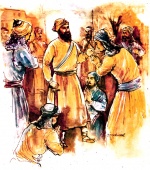Template:AOW15: Difference between revisions
Hari singh (talk | contribs) No edit summary |
Hari singh (talk | contribs) No edit summary |
||
| Line 1: | Line 1: | ||
<h1 style="margin: 0; background-color:#FFE4E1; font-size: 125%; font-weight:bold; border: 1px solid #ffc9c9; margin-top:.0em; margin-bottom:.2em; padding:0.2em 0.2em; text-align: center; color:#FF6600">[[Sahibzada Ajit Singh | <h1 style="margin: 0; background-color:#FFE4E1; font-size: 125%; font-weight:bold; border: 1px solid #ffc9c9; margin-top:.0em; margin-bottom:.2em; padding:0.2em 0.2em; text-align: center; color:#FF6600">[[Sahibzada Ajit Singh]]</h1> | ||
[[Image:Baba ajit singh.jpg|thumb|150px|left|<small>[[Sahibzada Ajit Singh]] saying farewell to his father, [[Guru Gobind Singh]]</small>]] | [[Image:Baba ajit singh.jpg|thumb|150px|left|<small>[[Sahibzada Ajit Singh]] saying farewell to his father, [[Guru Gobind Singh]]</small>]] | ||
'''[[Sahibzada Ajit Singh]]''' (1687 - 1705), the eldest of four sons of [[Guru Gobind Singh]], was born to [[Mata Jito]] ji (also known as [[Mata Sundari]] ji) at Paonta on '''11 February 1687'''. The following year, Guru Gobind Singh returned with the family to [[Anandpur]] where Ajit Singh was brought up in the approved Sikh style. He was taught the religious texts, philosophy and history, and had training in the martial arts such as riding, swordsmanship, [[gatka]] and archery. He grew up to be a handsome young man, strong, intelligent and a natural leader of people. Soon after the creation of the [[Khalsa]] on 30 March 1699, he had his first test of skill. A group of Sikhs ([[sangat]]) coming from Pothohar, northwest Punjab, was attacked and looted on the way by the Ranghars of Nuh, a short distance from [[Anandpur]] across the River [[Sutlej]]. [[Guru Gobind Singh]] sent [[Sahibzada Ajit Singh]], barely 12 years of age then, to that village. <big> '''[[Sahibzada Ajit Singh| Read more .....]]'''</big> | '''[[Sahibzada Ajit Singh]]''' (1687 - 1705), the eldest of four sons of [[Guru Gobind Singh]], was born to [[Mata Jito]] ji (also known as [[Mata Sundari]] ji) at Paonta on '''11 February 1687'''. The following year, Guru Gobind Singh returned with the family to [[Anandpur]] where Ajit Singh was brought up in the approved Sikh style. He was taught the religious texts, philosophy and history, and had training in the martial arts such as riding, swordsmanship, [[gatka]] and archery. He grew up to be a handsome young man, strong, intelligent and a natural leader of people. Soon after the creation of the [[Khalsa]] on 30 March 1699, he had his first test of skill. A group of Sikhs ([[sangat]]) coming from Pothohar, northwest Punjab, was attacked and looted on the way by the Ranghars of Nuh, a short distance from [[Anandpur]] across the River [[Sutlej]]. [[Guru Gobind Singh]] sent [[Sahibzada Ajit Singh]], barely 12 years of age then, to that village. <big> '''[[Sahibzada Ajit Singh| Read more .....]]'''</big> | ||
Revision as of 18:17, 11 February 2007
Sahibzada Ajit Singh
Sahibzada Ajit Singh (1687 - 1705), the eldest of four sons of Guru Gobind Singh, was born to Mata Jito ji (also known as Mata Sundari ji) at Paonta on 11 February 1687. The following year, Guru Gobind Singh returned with the family to Anandpur where Ajit Singh was brought up in the approved Sikh style. He was taught the religious texts, philosophy and history, and had training in the martial arts such as riding, swordsmanship, gatka and archery. He grew up to be a handsome young man, strong, intelligent and a natural leader of people. Soon after the creation of the Khalsa on 30 March 1699, he had his first test of skill. A group of Sikhs (sangat) coming from Pothohar, northwest Punjab, was attacked and looted on the way by the Ranghars of Nuh, a short distance from Anandpur across the River Sutlej. Guru Gobind Singh sent Sahibzada Ajit Singh, barely 12 years of age then, to that village. Read more .....

